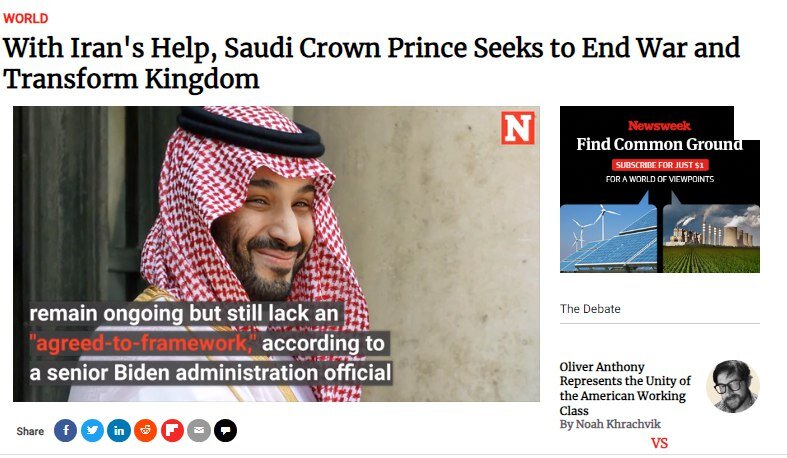By Abdolrahim Ansari

TEHRAN- On August 24, Newsweek published an article titled “With Iran’s Help, Saudi Crown Prince Seeks to End War and Transform Kingdom”.
After a 7-year hiatus that had gradually increased hostilities between Iran and Saudi Arabia, relations between the two countries were restored due to trust-building efforts by both sides. Now hopes for a reduction in tensions and raising the level of cooperation have been revived. The restored relation, which of course needed to happen earlier, has now provided the basis for analysis by many experts and analysts around the world, each of them expressing their views according to the importance of the issue.
Tom O'Connor, the writer of the Newsweek article, sought the views of some experts on the Persian Gulf affairs to cast light on Saudi Crown Prince Mohammed bin Salman's attempt to achieve stability and reduce tensions with Iran in order to focus on economic progress. The views seem correct on the surface, but there are major flaws in the explanation of the details.
The idea that Iran uses the provision of security in Saudi Arabia as a means for its own financial interests is fundamentally wrong. Yet, Iran always seeks effective cooperation with all countries, including its neighbors, and has never invaded any country in recent centuries. Iran’s deterrence power is used just to defend itself.
If Yemen has turned into a swamp for Saudi Arabia, this is the result of the Saudi officials’ miscalculation about Yemen's defense capability and their reliance on the wrong analysis and advice by their American advisors. The world has to face the truth that Iranians are not fighting or resisting the invasion of the Saudi-led coalition in Sana'a and other parts of Yemen; but the Yemenis have succeeded in creating deterrence despite the blockade and severe sanctions, which has nothing to do with the Islamic Republic of Iran, neither the start of the war in Yemen nor its end.
Iran has never withheld its humanitarian aid from the people of Yemen, but the severe blockade on Yemen has deterred Iran from sending relief aid to Yemenis. The severe blockade itself is the greatest reason for the non-interference of Iranians in the war.
Tehran will definitely try to establish a permanent ceasefire, prevent a reignition of conflict, and establish peace, and in this regard, it can play an effective role in providing security for Saudis and Yemenis. The Islamic Republic of Iran has only one enemy, which is the Zionist regime, so Iran pays special attention to cooperation and relations with its Muslim neighbors.
It is appreciable that Mohammed bin Salman has drawn up an economic vision for his country and intends to ensure the security of the region with the help of Iran in order to expand the position and economic influence of Saudi Arabia in the region and the world. This is exactly what Iranians have demanded many times and they have always said that security should be provided by the countries in the region without the interference of foreigners. Iran does not tolerate U.S. interference in the Persian Gulf region but it does not oppose its neighbors, including Saudi Arabia.
Umar Karim, an associate fellow at the King Faisal Research and Islamic Studies Center, pointed out that since the agreement between Iran and Saudi Arabia with the Chinese mediation no missiles have been fired at Saudi Arabia nor a drone flown over the country. He also said that Saudi Arabia lacks real leverage against Ansar Allah. The fact that the Saudis do not have strong leverage in the battle with Ansar Allah, or the coincidence of the Riyadh-Sana's ceasefire with the Tehran-Riyadh rehabilitation of ties cannot be a convincing reason to prove Iran's role in the Yemen war. The ceasefire has been set up with the agreement of the Saudi and Yemeni sides, and definitely if Saudi Arabia opens its eyes to the facts, it can have much more progress.
As was written in Newsweek, both Iran and Saudi Arabia consider the economic factor so important, and insecurity in the region is harmful to the economic progress of both sides. But it should not be forgotten that the war in Yemen is only part of the obstacles to Saudi Arabia's economic progress, and getting rid of it will create a good leap. In fact, the major insecurities in the region are directly or indirectly related to the U.S. and Israel, which the Arab countries should pay more attention to, think about it, and find a suitable solution for it through cooperation with the neighbors.

No comments:
Post a Comment